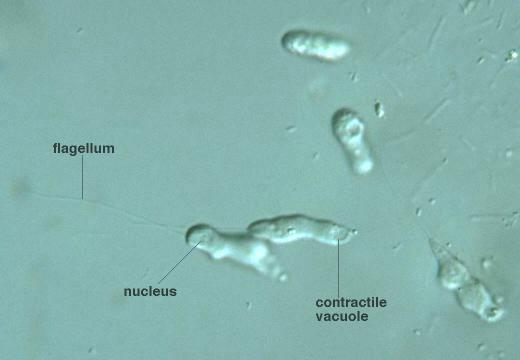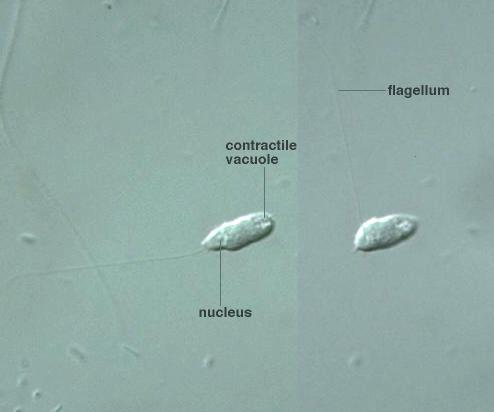

Zoomastigophora: Rhizomastigida
Xenophyophorea: Pelobiontida: Mastigamoebidae:
Mastigamoeba longfilum
Stokes
 Genus: Monomastigote, uninucleate, with finger-like pseudopodia; flagellum long and connected with
nucleus (Kudo, 1966).
Genus: Monomastigote, uninucleate, with finger-like pseudopodia; flagellum long and connected with
nucleus (Kudo, 1966).
Species:
28 μm long when extended;
elongate, tranparent; flagellum twice body length; pseudopods few short;
contractile vacuole anterior (Kudo, 1966).
|
Similar genus -->> Mastigella;
Mastigina
Mastigamoeba longfilum,
similar to M. longifilum but flagellum shorter, contractile vacuole posterior,
flagellate state, cell body 31-46 μm long, 8 μm wide,
flagellum 31-62 μm long,
x 400, x 640, Shitami Oike, Higashi-hiroshima, Hiroshima Pref., Japan, collected October 1998, photo March 1999 by Y. Tsukii
 50 μm
50 μm
 100 μm
100 μm
 150 μm; x 400
150 μm; x 400











Turning around flagellum,
cell body 22 μm long, 8 μm wide, flagellum 62 μm long,







Mastigamoeba aspera Schulze:
Locomotive 150-200 μm long,
50 μm wide;
during locomotin elongate and narrowed anteriorly, posterior end rounded or lobed;
pseudopods slender, straight; two contractile vacuoles (Kudo, 1966).
* Mastigamoeba longifilum Stokes:
28 μm long when extended;
elongate, tranparent; flagellum twice body length; pseudopods few short;
contractile vacuole anterior (Kudo, 1966).
Mastigamoeba setosa (Goldschmidt):
Up to 140 μm long (Kudo, 1966).
Mastigamoeba hylae (Frenzel):
In the hind-gut of the tadpoles of frogs and toads;
80-135 μm long,
21-31 μm wide;
flagellum about 10 μm (Kuod, 1966).
Please click on images for viewing enlarged.
Copyright
Protist Information Server
 Genus: Monomastigote, uninucleate, with finger-like pseudopodia; flagellum long and connected with
nucleus (Kudo, 1966).
Genus: Monomastigote, uninucleate, with finger-like pseudopodia; flagellum long and connected with
nucleus (Kudo, 1966).

















